《英语听说课程》教学大纲_3
最新大学英语教学大纲(1-4级完整版)

大学英语教学大纲福建农林大学金山学院目录《大学英语》一级课程 (2)《大学英语》二级课程教学大纲 (9)《大学英语》三级课程教学大纲 (16)《大学英语》四级课程 (23)《大学英语》一级课程(College English Band 1)一、简要说明:参照国家教育部制订的《大学英语课程教学要求》, 同时根据我校教学资源、学生入学水平以及所面临的社会需求等实际情况, 特制订本《大学英语教学大纲》,作为我校组织非英语专业本科、专升本学生英语教学的主要依据, 用于指导本校的大学英语教学。
大学英语课程教学包括听、说、读、写四个部分。
二、课程性质、地位和任务:大学英语教学是高等教育的一个有机组成部分,大学英语课程是大学生必修的一门基础课程。
大学英语教学是以英语语言知识与应用技能、学习策略和跨文化交际为主要内容,以外语教学理论为指导,并集多种教学模式和教学手段为一体的教学体系。
大学英语的教学目标是培养学生英语综合应用能力,特别是听说能力,使他们在今后工作和社会交往中能用英语有效地进行口头和书面的信息交流,同时增强其自主学习能力、提高综合文化素养,以适应我国经济发展和国际交流的需要。
三、教学基本要求和方法:(一)教学基本要求1.听力能力要求:能听懂简单的日常会话和课堂用语,能听懂语速为每分钟100词左右的英语短文并理解其中心大意和要点。
2.口语能力要求:在实际交际中做到语音、语调较为自然、得体和流畅;熟悉个人、家庭、日常生活、兴趣爱好、风俗习惯、职业、节日、社交礼仪等方面的话题,并能就这些话题进行简单的会话或陈述。
3.写作能力要求:掌握描述时间、地点、方位的基本表达方式;掌握比较人、物体及事物的基本表达方式;能使用适当的语言形式进行描述和表达观点、态度和情感等;能根据特定目的有效地进行简单的文字表达。
4.阅读能力要求:能读懂语言难度一般的普通题材的文章,领会掌握一些基本的阅读技巧,掌握中心大意及主要事实和有关细节,阅读速度达到每分钟60词。
大学英语视听说3 大纲

安徽外国语学院课程教学大纲一、课程基本信息二、课程教学目的英语视听说课程的教学目的是培养学生扎实的语言基本功和听说专业技能,即加强学生英语听力能力的同时着重发展学生的英语听说能力。
使学生在今后的工作和社会交往中能用英语有效地进行口头信息交流,同时培养和训练学生自主学习能力,提高综合文化素养,以适应我国社会发展和国际交流的需要,使学生能够真正具有良好的国际交流能力。
三、课程教学要求本课程教学大纲在教学要求上分为一般要求阶段(一年级)和较高要求阶段(二年级),本课程属于较高要求阶段。
现将本课程的教学要求规定如下:1、词汇:通过本课程的学习,学生的词汇量应应达到4500个单词和700个词组,其中2000个单词和500个词组为积极词汇,即要求学生能够在认知的基础上学会熟练运用,包括口头表达以及书面表达两个方面。
2、语法:巩固和加深基本语法知识,提高在语篇水平上运用句法结构的能力。
3、听的能力:能听懂英语讲课内容,能听懂一般性英语谈话和一般性题材讲座。
能基本听懂英语国家慢速英语教学节目,语速为每分钟130词左右,能掌握其中大意,抓住要点和有关细节。
能运用基本的听力技巧帮助领会讲话者的观点和态度。
4、说的能力:能在学习过程中与老师、同学进行交流,并能就某一主题进行讨论。
能就日常话题和来自英语国家的人士进行交谈。
能就所熟悉的话题经准备后作简短发言,表达比较清楚,语音、语调基本正确。
能在交谈中使用基本的会话策略。
四、课程教学内容和学时安排五、教学内容Unit 1 Access to Success1. Teaching ObjectivesTalk about SuccessTake notes by using a keyword outlineRefer to what you said earlierTalk about a challenge / an achievementHave a basic understanding of public speaking2. Key PointsHow to grasp the listening skill: note-taking by using a keyword outlineHow to grasp the speaking skill: refer to what you said earlierImportant and useful words and expressions3. Difficult PointsMastering the listening skill: note-taking by using a keyword outlineMastering the speaking skill: refer to what you said earlierContent1.Opening up2. Listening to the world1) Sharing: How do they feel about trying new things?What stops them from trying new things?What have they achieved in their life that makes them feel proud?Who do they admire in terms of achievements and why?2) Listening: before listening; while listening; after listening3) Viewing: before viewing; while viewing; after viewing3. Speaking for 3communication1).Role-play2).Speaking skills: Referring to what you said earlier3).Group discussion: The most impressive challengea.Get ideasb.Discuss and organize ideasc.Present ideas4. Further practice in listening1) Short conversations2) Long conversation3) Two passages5. Wrapping upUse the following self-assessment checklist to check what you have learned in this unit.6. CET-6 Training: Vocabulary1) The importance of enlarging one’s vocabulary2) Skills for memorizing vocabulary3) Analysis with examples4) CET-6 model listening trainingUnit 2 Emotions speak louder than words1. Teaching ObjectivesTalk about different emotionsGet familiar with the usage of problem-solution pattern.Know some signal words2. Key PointsHow to grasp the listening skill:Predict the theme and relevant vocabulary before you listenGrasp some signal words3. Difficult PointsThe usage of the problem-solution patternThe understanding of the organization of a speechThe usage of organizing ideasContent1.Opening up2. Listening to the world1) Sharing: How are they feeling today? Why?Would you describe yourself as an optimist or a pessimist? Why?What’s the best thing that’s happened to you this year?2) Listening: before listening; while listening; after listening3) Viewing: before viewing; while viewing; after viewing3. Speaking for communication1).Role-play2).Speaking skills: Overall organization of a speech3).Group discussion: The most impressive experiencea.Get ideasb.Discuss and organize ideasc.Present ideas4. Further practice in listening1) Short conversations2) Long conversation3) Two passages5. Wrapping upUse the following self-assessment checklist to check what you have learned in this unit.6. CET-6 Training: Listening for Conversations1) Skills for listening to conversations2) Analysis with examples3) CET-6 model listening trainingUnit 3 Love your neighbor1. Teaching ObjectivesTalk about neighbors and communitiesDistinguish fact from opinion in listeningLearn how to tell a story2. Key PointsTalk about planning a communityKnow the rules of about language use in public speakingUseful expressions3. Difficult PointsHow to grasp the specific informationHow to distinguish fact from opinion in listeningHow to learn public speaking skillsContent1. Opening up2. Listening to the world1) Sharing: Do you know your neighbors? How well do you know them?What do you think makes a good/bad neighbor?2) Listening: before listening; while listening; after listening3) Viewing: before viewing; while viewing; after viewing3. Speaking for communication1).Role-play2).Speaking skills: language in public speaking3).Group discussion: Way of planning a new communitya.Get ideasb.Discuss and organize ideasc.Present ideas4. Further practice in listening1) Short conversations2) Long conversation3) Two passages5. Wrapping upUse the following self-assessment checklist to check what you have learned in this unit.6. CET-6 Training: Listening for Long Conversations1) Skills for listening to long conversations2) Analysis with examples3) CET-6 model listening trainingUnit 4 What’ s the Big Idea?1.Teaching ObjectivesTalk about inventions and creative ideasPredict the theme and relevant vocabulary before you listenPropose ideas and comment on ideas while brainstorming2.Key PointsHow to grasp the listening skill:Predict the theme and relevant vocabulary before you listenHow to grasp the speaking skill: brainstorming3.Difficult PointsLearn to use voice, body language and visual aids in speech deliveryThe understanding of the organization of a speechThe usage of organizing ideasContent1. Opening up2. Listening to the world1) Sharing: What items do they enjoy buying most?What sorts of things do they buy on impulse?What recent product or service do they think is impressive?2) Listening: before listening; while listening; after listening3) Viewing: before viewing; while viewing; after viewing3. Speaking for communication1).Role - play2).Speaking skills: Making guesses3).Group discussion: Your business ideasa.Get ideasb.Discuss and organize ideasc.Present ideas4. Further practice in listening1) Short conversations2) Long conversation3) Two passages5. Wrapping upUse the following self-assessment checklist to check what you have learned in this unit.6. CET-6 Training: Listening for Passages1) Skills for listening to passages2) Analysis with examples3) CET-6 model listening trainingUnit 5 More than a paycheck1.Teaching ObjectivesTalk about different jobsListen for contrastManage a meeting/discussion2.Key PointsHow to master different kinds of jobsHow to get familiar with the topic of managing a meeting3.Difficult PointsHow to grasp the specific informationHow to listen for contrastHow to learn public speaking skillsContent1. Opening up2. Listening to the world1)Sharing: Have you ever considered the potential disadvantages of your dream job? Are you prepared to accept them when you take the job?Suppose you see your dream job advertised. Unfortunately, it asks for several specific skills and you’ve only got some of them. What would you probably?2) Listening: before listening; while listening; after listening3) Viewing: before viewing; while viewing; after viewing3. Speaking for communication1).Role-play2).Speaking skills: Managing a meeting3).Group discussion: Talk about a typical day in lifea.Get ideasb.Discuss and organize ideasc.Present ideas4. Further practice in listening1) Short conversations2) Long conversation3) Two passages5. Wrapping upUse the following self-assessment checklist to check what you have learned in this unit.6. CET-6 Training: Listening for Recordings of Lectures or Talks1) Skills for listening to recordings of lectures and or talks2) Analysis with examples3) CET-6 model listening trainingUnit 6 Histories make men wise1. Teaching ObjectivesTalk about important events and people in historyMake inferencesExpress uncertaintyTalk about an imaginary historyMake an informative speech in chronological or spatial order2. Key PointsHow to master the history of different periodsHow to get familiar making inferencesUseful expressions3. Difficult PointsHow to grasp the specific informationHow to express uncertaintyHow to make an informative speech in chronological or spatial orderContent1. Opening up2. Listening to the world1)Sharing: Do you think life better know than in the past?If you could have lived through a different age or decade, which would you choose and why?2) Listening: before listening; while listening; after listening3) Viewing: before viewing; while viewing; after viewing3. Speaking for communication1)Role-play2)Speaking skills: Expressing uncertainty3)Group discussion:What would have happened if Zheng He had reached the Americas first?a.Get ideasb.Discuss and organize ideasc.Present ideas4. Further practice in listening1) Short conversations2) Long conversation3) Two passages5. Wrapping upUse the following self-assessment checklist to check what you have learned in this unit.6. CET-6 Training: Listening for News Reports1) Skills for listening to news reports2) Analysis with examples3) CET-6 model listening training。
大学英语视听说课教学大纲
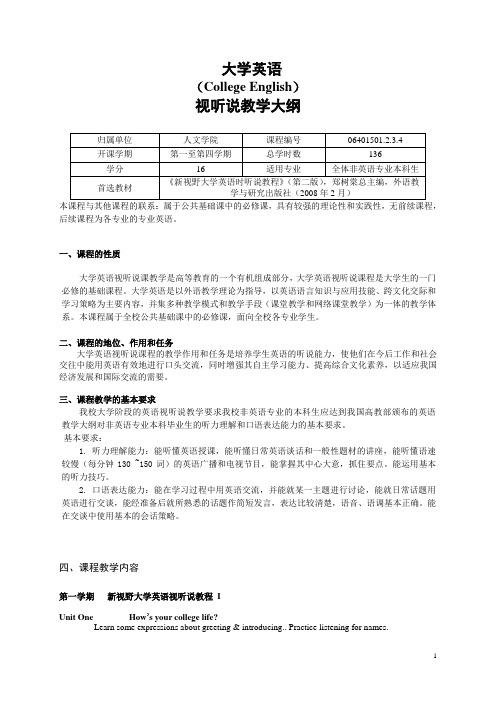
大学英语(College English)视听说教学大纲本课程与其他课程的联系:属于公共基础课中的必修课,具有较强的理论性和实践性,无前续课程,后续课程为各专业的专业英语。
一、课程的性质大学英语视听说课教学是高等教育的一个有机组成部分,大学英语视听说课程是大学生的一门必修的基础课程。
大学英语是以外语教学理论为指导,以英语语言知识与应用技能、跨文化交际和学习策略为主要内容,并集多种教学模式和教学手段(课堂教学和网络课堂教学)为一体的教学体系。
本课程属于全校公共基础课中的必修课,面向全校各专业学生。
二、课程的地位、作用和任务大学英语视听说课程的教学作用和任务是培养学生英语的听说能力,使他们在今后工作和社会交往中能用英语有效地进行口头交流,同时增强其自主学习能力、提高综合文化素养,以适应我国经济发展和国际交流的需要。
三、课程教学的基本要求我校大学阶段的英语视听说教学要求我校非英语专业的本科生应达到我国高教部颁布的英语教学大纲对非英语专业本科毕业生的听力理解和口语表达能力的基本要求。
基本要求:1. 听力理解能力:能听懂英语授课,能听懂日常英语谈话和一般性题材的讲座,能听懂语速较慢(每分钟130 ~150词)的英语广播和电视节目,能掌握其中心大意,抓住要点。
能运用基本的听力技巧。
2. 口语表达能力:能在学习过程中用英语交流,并能就某一主题进行讨论,能就日常话题用英语进行交谈,能经准备后就所熟悉的话题作简短发言,表达比较清楚,语音、语调基本正确。
能在交谈中使用基本的会话策略。
四、课程教学内容第一学期新视野大学英语视听说教程IUnit One How’s your college life?Learn some expressions about greeting & introducing.. Practice listening for names.Listening Skills: Listening for NamesFunctions: Greeting and IntrducingAutonomous Learning:First, students are required to do some listening, do some speakingand role-play, then do some exercises assigned by teacher related tounit one.Unit Two Do you work out?Asking for and giving directions are quite useful in our daily life. What kind of expressions, then, do you use when you ask for and give directions? If you aren’t quite sure of such expressions, never mind. The activities in this unit will be helpful.Listening Skills: Identifying NumbersFunctions: Asking for and Giving DirectionsAutonomous Learning: First, students are required to do some listening, do some speakingand role-play, then do some exercises assigned by teacher related tounit two.Unit Three Telling me about your friendsLearn some expressions about congratulating & sympathizing. Practice listening for understanding times and dates.Listening Skills: Understaning Times and DatesFunctions: Congratulating and SympathizingAutonomous Learning:First, students are required to do some listening, do some speakingand role-play, then do some exercises assigned by teacher related tounit three.Unit Four How’s the weather today?Learn some expressions about making complaints and giving warnings. Practice listening for telephone numbers.Listening Skills: Listening for Telephone NumbersFunctions: Making Complaints and Giving WarningsAutonomous Learning: First, students are required to do some listening, do some speakingand role-play, then do some exercises assigned by teacher related tounit four.Unit Five What’s your favorite food?Learn some expressions about asking for and offering suggestions. Practice listening for people’s food preferences.Listening Skills: Listening For People’s Food PreferencesFunctions: Asking for and Offering SuggestionsAutonomous Learning:First, students are required to do some listening, do some speakingand role-play, then do some exercises assigned by teacher related tounit five.Unit six Talking about HealthWhat kind of expressions, then, do we use when we talk about health? If students aren’t sure of such expressions, never mind. The activities in this unit will be helpful. .Listening Skills: Listening to People TalkFunctions: Expressing Worries and ReassuranceAutonomous Learning:First, students are required to do some listening, do somespeaking and discussion, then do some exercises assigned byteacher related to unit six.Unit seven How much does it cost?Some of the expressions for making and responding to requests will be learned in this unit.After listening, the students will know how to identify prices.Listening Skills: Identifying PricesFunctions: Making and Responding to RequestsAutonomous Learning: First, students are required to do some listening, do somespeaking and discussion, then do some exercises assigned byteacher related to unit seven.Unit Eight On or off campus?The expressions for making denying & admitting will be learned. Students practice listening for rents or charges.Listening Skills: Listening for Rents or ChargesFunctions: Denying and AdmittingAutonomous Learning:First, students are required to do some listening, do somespeaking and discussion, then do some exercises assigned byteacher related to unit eightUnit Nine Do you surf the Net?The expressions for focusing attention will be learned. Students practice listening for making calculations.Listening Skills: Making CalculationFunctions: Focusing AttentionAutonomous Learning:First, students are required to do some listening, do somespeaking and discussion, then do some exercises assigned byteacher related to unit nineUnit ten Have a nice holiday!Making a plan and invitations are quite common in our daily life. What kind of expressions,then, do you use when you tell someone your plan, or express invitation? If you aren’t quite sure of such expressions, never mind. The activities in this unit will be helpful.Listening Skills: Identifying the Main InformationFunctions: Giving InvitationsAutonomous Learning:First, students are required to do some listening, do somespeaking and role-play, then do some exercises assigned by theteacher related to unit ten.第二学期新视野大学英语视听说教程IIUnit One Roll over, Beethoven!Expressing likes and dislikes; making suggestions.Listening Skills: Making InferencesFunctions: Expressing Likes and Dislikes; Making SuggestionsAutonomous Learning:First, students are required to do some listening, do some speakingand role-play, then do some exercises assigned by the teacher relatedto unit one.Unit Two What’s on at the theater?Making comments; giving and accepting invitation.Listening Skills: Making InferencesFunctions: Making Comments; Giving and AcceptingAutonomous Learning:First, students are required to do some listening, do some speakingand role-play, then do some exercises assigned by the teacher relatedto unit two.Unit Three Every Jack has his Jill!Comforting people; expressing worries; conceding a point.Listening Skills: Identifying People’s ProfessionFunctions: Comforting People; Expressing Worries; Conceding a PointAutonomous Learning:First, students are required to do some listening, do some speakingand role-play, then do some exercises assigned by the teacher relatedto unit three.Unit Four Beware of ads!Asking for clarification and clarifying.Listening Skills: Identifying the Associative Meaning of AdsFunctions: Asking for Clarification and ClarifyingAutonomous Learning:First, students are required to do some listening, do some speakingand role-play, then do some exercises assigned by the teacher relatedto unit four.Unit Five Does your best friend have four legs?Giving short responses; praising; making recommendations.Listening Skills: Identifying Special QuantitiesFunctions: Giving Short Responses; Praising; Making recommendationAutonomous Learning:First, students are required to do some listening, do some speakingand role-play, then do some exercises assigned by the teacher relatedto unit five.Unit Six What’s in Fashion?Listening Skills: Identifying the Relationship Between the SpeakersFunctions: Asking for and giving opinions.Autonomous Learning:First, students are required to do some listening, do some speakingand role-play, then do some exercises assigned by the teacher relatedto unit six.Unit Seven Does money talk?.Listening Skills: Identifying Larger NumbersFunctions: Expressing real and unreal conditionsAutonomous Learning:First, students are required to do some listening, do some speakingand role-play, then do some exercises assigned by the teacher relatedto unit seven.Unit Eight Crime does pay!Listening Skills: Identifying Signal WordsFunctions: Bringing up sensitive topics; asking for details.Autonomous Learning:First, students are required to do some listening, do some speakingand role-play, then do some exercises assigned by the teacher relatedto unit eight.Unit Nine Are you safe today?Elaborating; Speaking Hypothetically.Listening Skills: Listening for DetailsFunctions: Elaborating; Speaking HypotheticallyAutonomous Learning:First, students are required to do some listening, do some speakingand role-play, then do some exercises assigned by the teacher relatedto unit nine.Unit Ten Want freedom from fear?Expressing fear and desperation; offering sympathy and encouragement.Listening Skills: Identifying Main EventsFunctions: Expressing fear and desperation; offering sympathy and encouragement.Autonomous Learning: First, students are required to do some listening, do some speaking androle-play, then do some exercises assigned by the teacher related to unit ten.第三学期新视野大学英语视听说教程IIIUnit one With Alzheimer’s, you meet a lot of new peopleWhat kind of expressions, then, do we use when we express negative attitudes? If students aren’t sure of such expressions, never mind. The activities in this unit will be helpful. .Functions: Describing Good and Poor Memory; Expressing Sympathy; Interrupted SpeedchAutonomous Learning:First, students are required to do some listening, do somespeaking and role-play, then do some exercises assigned by theteacher related to unit one.Unit two This is going to be a great semester?Blame and complaint are two means of showing our dissatisfaction and criticism. What kind of expressions, then, do we use when we say that someone is responsible for things done (badly or wrongly) or not done or when we want to make complaints? If students are not sure of such expressions, never mind. The activities in this unit will be helpful.Functions: T aling About V arious Aspects of School Life; Making and Replying toSuggestions; Using ExaggerationsAutonomous Learning:First, students are required to do some listening, do somespeaking and role-play, then do some exercises assigned by theteacher related to unit two.Unit three Single parent, double trouble?In daily communication, we may like to express our requests, suggestions, commands and warnings. What kind of expressions, then do we use when we talk about our requests, suggestions, commands and warnings? If you aren’t sure of such expressions, never mind. The activities in this unit will be helpful.Functions: Talking About Marriage and Family Life; Making Comparison; ExpressingdisagreementAutonomous Learning:First, students are required to do some listening, do somespeaking and role-play, then do some exercises assigned by theteacher related to unit three.Unit four The devil finds work for idle handsNo one is totally certain about what is to happen to us next. In our daily life, we feel certain, uncertain or likely and unlikely when we try to predict events. What kind of expressions, then, do we use when we want to express our feelings of certainty, uncertainty, possibility and impossibility. If you aren’t quite sure of such expressions, never mind. The activities in this unit will be helpful.Functions: Handling resumes and preparing for job interviews; Giving advice;Describing requirementsAutonomous Learning:First, students are required to do some listening, do somespeaking and role-play, then do some exercises assigned by theteacher related to unit four.Unit five These are businesses for the brave.In daily communication, we may express our belief in or doubt about some people, ideas, or happenings. What kind of expressions, then, do we use when we want to express our belief or doubt? If you aren’t sure of such expressions, never mind. The activities in this unit will be helpful.Functions: T alking about business activities; Expressing certainty; ExpressingreservationAutonomous Learning:First, students are required to do some listening, do somespeaking and role-play, then do some exercises assigned by theteacher related to unit five.Unit six Here is a darker side of society.Nothing is totally certain about the future. In our daily life, we may try to predict events, make plans and state our intentions, or help others remember future actions. Predicting, promising and reminding are three means of talking, planning or helping in relation to future events or actions. What kind of expressions, then, do we use when we want to talk about future events or actions? If you aren’t quite sure about such expressions, never mind. The activities in this unit can be helpful.Functions: E iscussing different kinds of social problems; Providing solutions andsuggestions; Making concessionsAutonomous Learning:First, students are required to do some listening, do somespeaking and role-play, then do some exercises assigned by theteacher related to unit six.Unit seven Our globe is in danger!It is quite useful to know how to show surprise and interest, and how to express emphasis in our daily life. What kind of expressions, then, do you usually use when you show surprise and interest and express emphasis?Functions: D iscussing environmental problems; Resuming serious talk; Asking in retortAutonomous Learning:First, students are required to do some listening, do somespeaking and role-play, then do some exercises assigned by theteacher related to unit seven.Unit eight Flying there is not half the fun.It is quite useful to know how to express satisfaction and disappointment in our daily life.What kind of expressions, then, do you usually use when you express satisfaction anddisappointment? If you aren’t quite sure of such expressions, never mind. The activities in this unit will be helpful.Functions: Booking a flight or a hotel room; Describing a process; ComplainingAutonomous Learning:First, students are required to do some listening, do somespeaking and role-play, then do some exercises assigned by theteacher related to unit eight.Unit nine Here are the seasons to be jolly.Annoyance, fear and desire are three major means of expressing emotion. What kind of expressions, then, do we use when we talk about annoyance, fear and desire ? If you aren’t sureabout such expressions, never mind. The activities in this unit will be helpful.Functions: Describing holidays and festivals in different countries; Describing details;Asking for clarificationAutonomous Learning:First, students are required to do some listening, do somespeaking and role-play, then do some exercises assigned by theteacher related to unit nine.Unit ten Buy low and sell high on the stock market.Point of time, duration, and time relation are three major means of showing time. What kind of expressions, then, do we use when we talk about point of time, duration, and time relation? If you aren’t sure of such expressions, never mind. The activities in this unit will be helpful.Functions: Describing the rise and fall of stocks; Analyzing a difficult situation; Askingfor the giving opinionsAutonomous Learning:First, students are required to do some listening, do somespeaking and role-play, then do some exercises assigned by theteacher related to unit ten.第四学期新视野大学英语视听说教程IVUnit one Enjoy your feeling!Frequency is a rate at which things happen or are repeated. Sequence refers to the order in which things or especially events follow one another. What kind of expressions, then, do we usewhen we talk about frequency and sequence? If you aren’t quite sure of such expressions, nevermind. The activities in this unit will be helpful.Functions: Describing anger, sadness and happiness; Making and accepting suggestions;Promising and refusing to helpAutonomous Learning: First, students are required to do some listening, do somespeaking and role-play, then do some exercises assigned by theteacher related to unit one.Unit Two Beauty can be bought.Talking about position, direction and movement is very common in our daily life. What kind of expressions, then, do we use when we describe position, give directions and expressmovement? If you aren’t quite sure of such expressions, never mind. The activities in this unitwill be helpful.Functions: Describing plastic surgery; Expressing surprise, annoyance and determination;Declining and accepting an invitationAutonomous Learning: First, students are required to do some listening, do somespeaking and role-play, then do some exercises assigned by theteacher related to unit two.Unit Three Watch out when nature strikes backIt is quite useful to know how to express length, width, height and depth. What kind of expressions, then, do you usually use when you express length, width, height and depth ? If you aren’t quite sure of such expressions, never mind. The activities in this unit will be helpful.Functions: Describing natural disasters; Describing fear; Inverting for emphasis;Speaking with uncertaintyAutonomous Learning: First, students are required to do some listening, do somespeaking and role-play, then do some exercises assigned by theteacher related to unit three.Unit Four Is work just another four-letter word?Leaving and taking messages; making and postponing an appointment; expressing thanks Functions: Leaving and taking messages; Making and postponing an appointment;Expressing thanksAutonomous Learning:First, students are required to do some listening, do some speakingand role-play, then do some exercises assigned by the teacher relatedto unit four.Unit Five Distant pastures are always greener.Describing job-hopping; asking for and giving reasons; expressing regretFunctions: D ismissing an employee; Describing job-hopping; Asking for and givingreasons; Expressing regretAutonomous Learning: First, students are required to do some listening, do some speakingand role-play, then do some exercises assigned by the teacher relatedto unit five.Unit Six The truth can be stranger than fiction.Describing superstitions; arguing for a possibility; adding informationFunctions: D escribing superstitions; arguing for a possibility; adding informationAutonomous Learning:First, students are required to do some listening, do some speakingand role-play, then do some exercises assigned by the teacher relatedto unit six.Unit Seven What shall we do when there’s nothing to do?It is quite useful to know how to make a generalization and conclusion in our daily life.What kind of expressions, then, do you usually use when you make these statements? If you aren’t quite sure of such expressions, never mind. The activities in this unit will be helpful.Functions: M aking suggestions; Expressing likes and dislikes; Expressing agreementAutonomous Learning: First, students are required to do some listening, do somespeaking and role-play, then do some exercises assigned by theteacher related to unit seven.Unit Eight Is biotechnology our friend or enemyIt is quite useful to know how to express cause and effect, aim and purpose in our daily life.What kind of expressions, then, do you usually use when you make these statements? If youaren’t quite sure of such expressions, never mind. The activities in this unit will be helpful.Functions: Talking about Gmfood, cloning and the Genetic Map; Expressing Doubts andunderstanding; Conceding a pointAutonomous Learning: First, students are required to do some listening, do somespeaking and role-play, then do some exercises assigned by theteacher related to unit eight.Unit Nine You can learn how to ride the business cycleConcession, real condition, unreal condition, supposition, and hypothesis are five major means of showing relationships. What kind of expressions, then, do we use when we make thesestatements? If you aren’t quite sure of such expressions, never mind. The activities in this unitwill be helpful.Functions: Asking for confirmation; Describing increases and decreases; Offering adifferent opinionAutonomous Learning: First, students are required to do some listening, do somespeaking and role-play, then do some exercises assigned by theteacher related to unit nine.Unit Ten Culture makes me what I amException, restriction, part and whole, and connection between parts are four major means of showing relations. What kind of expressions, then, do we use when we make these statements?If you aren’t quite sure of such expressions, never mind. The activities in this unit will behelpful.Functions: I nviting questions; Asking for reasons; Describing hard workAutonomous Learning: First, students are required to do some listening, do somespeaking and role-play, then do some exercises assigned by theteacher related to unit ten.五、课内实践教学要求1 课堂上进行英语听说练习,培养学生综合运用英语能力,布置作业要求学生完成每单元课文后练习题,进一步巩固每单元所学知识。
英语听说教学大纲
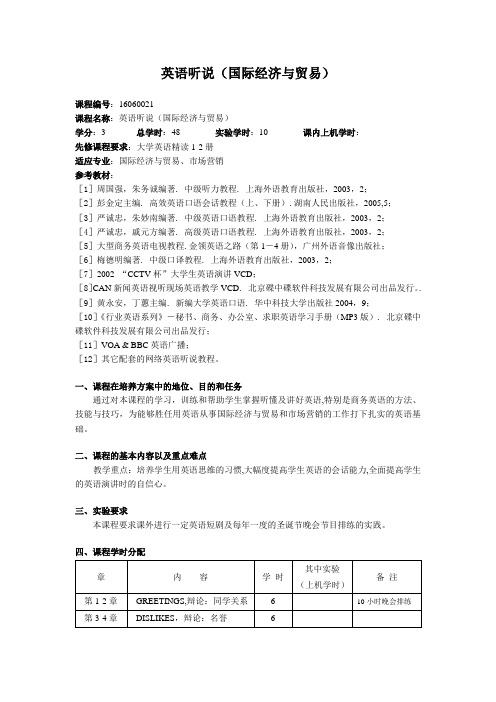
英语听说(国际经济与贸易)课程编号:16060021课程名称:英语听说(国际经济与贸易)学分:3 总学时:48 实验学时:10 课内上机学时:先修课程要求:大学英语精读1-2册适应专业:国际经济与贸易、市场营销参考教材:[1]周国强,朱务诚编著.中级听力教程.上海外语教育出版社,2003,2;[2]彭金定主编.高效英语口语会话教程(上、下册).湖南人民出版社,2005,5;[3]严诚忠,朱妙南编著.中级英语口语教程.上海外语教育出版社,2003,2;[4]严诚忠,戚元方编著.高级英语口语教程. 上海外语教育出版社,2003,2;[5]大型商务英语电视教程.金领英语之路(第1-4册),广州外语音像出版社;[6]梅德明编著.中级口译教程.上海外语教育出版社,2003,2;[7]2002 “CCTV杯”大学生英语演讲VCD;[8]CAN新闻英语视听现场英语教学VCD.北京碟中碟软件科技发展有限公司出品发行。
. [9]黄永安,丁蕙主编.新编大学英语口语.华中科技大学出版社2004,9;[10]《行业英语系列》-秘书、商务、办公室、求职英语学习手册(MP3版).北京碟中碟软件科技发展有限公司出品发行;[11]VOA & BBC英语广播;[12]其它配套的网络英语听说教程。
一、课程在培养方案中的地位、目的和任务通过对本课程的学习,训练和帮助学生掌握听懂及讲好英语,特别是商务英语的方法、技能与技巧,为能够胜任用英语从事国际经济与贸易和市场营销的工作打下扎实的英语基础。
二、课程的基本内容以及重点难点教学重点:培养学生用英语思维的习惯,大幅度提高学生英语的会话能力,全面提高学生的英语演讲时的自信心。
三、实验要求本课程要求课外进行一定英语短剧及每年一度的圣诞节晚会节目排练的实践。
四、课程学时分配五、考核方式本课程采取口试考试方式,结合平时成绩进行综合评定。
六、制订执笔者:王咏梅审核者:冯正强批准者:龚艳萍。
英语视听说课程教学大纲
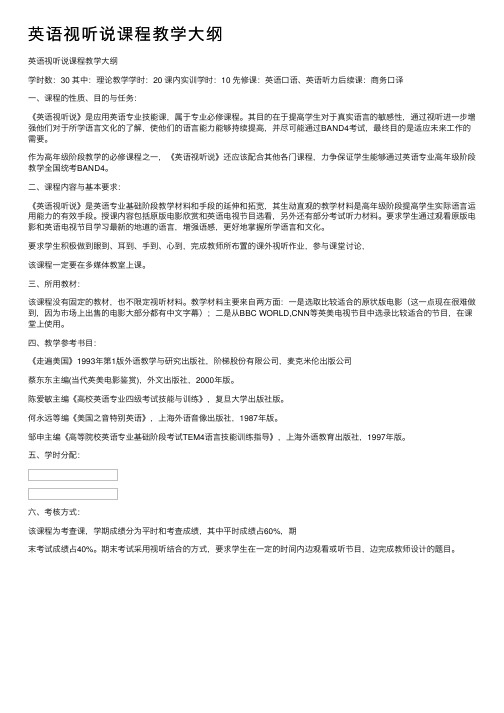
英语视听说课程教学⼤纲英语视听说课程教学⼤纲学时数:30 其中:理论教学学时:20 课内实训学时:10 先修课:英语⼝语、英语听⼒后续课:商务⼝译⼀、课程的性质、⽬的与任务:《英语视听说》是应⽤英语专业技能课,属于专业必修课程。
其⽬的在于提⾼学⽣对于真实语⾔的敏感性,通过视听进⼀步增强他们对于所学语⾔⽂化的了解,使他们的语⾔能⼒能够持续提⾼,并尽可能通过BAND4考试,最终⽬的是适应未来⼯作的需要。
作为⾼年级阶段教学的必修课程之⼀,《英语视听说》还应该配合其他各门课程,⼒争保证学⽣能够通过英语专业⾼年级阶段教学全国统考BAND4。
⼆、课程内容与基本要求:《英语视听说》是英语专业基础阶段教学材料和⼿段的延伸和拓宽,其⽣动直观的教学材料是⾼年级阶段提⾼学⽣实际语⾔运⽤能⼒的有效⼿段。
授课内容包括原版电影欣赏和英语电视节⽬选看,另外还有部分考试听⼒材料。
要求学⽣通过观看原版电影和英语电视节⽬学习最新的地道的语⾔,增强语感,更好地掌握所学语⾔和⽂化。
要求学⽣积极做到眼到、⽿到、⼿到、⼼到,完成教师所布置的课外视听作业,参与课堂讨论,该课程⼀定要在多媒体教室上课。
三、所⽤教材:该课程没有固定的教材,也不限定视听材料。
教学材料主要来⾃两⽅⾯:⼀是选取⽐较适合的原状版电影(这⼀点现在很难做到,因为市场上出售的电影⼤部分都有中⽂字幕);⼆是从BBC WORLD,CNN等英美电视节⽬中选录⽐较适合的节⽬,在课堂上使⽤。
四、教学参考书⽬:《⾛遍美国》1993年第1版外语教学与研究出版社,阶梯股份有限公司,麦克⽶伦出版公司蔡东东主编(当代英美电影鉴赏),外⽂出版社,2000年版。
陈爱敏主编《⾼校英语专业四级考试技能与训练》,复旦⼤学出版社版。
何永远等编《美国之⾳特别英语》,上海外语⾳像出版社,1987年版。
邹申主编《⾼等院校英语专业基础阶段考试TEM4语⾔技能训练指导》,上海外语教育出版社,1997年版。
五、学时分配:六、考核⽅式:该课程为考查课,学期成绩分为平时和考查成绩,其中平时成绩占60%,期末考试成绩占40%。
《英语听说》课程教学大纲
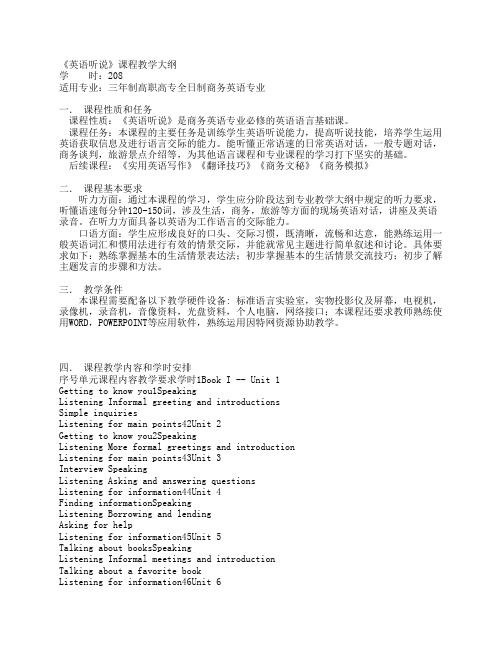
《英语听说》课程教学大纲学 时:208适用专业:三年制高职高专全日制商务英语专业一. 课程性质和任务 课程性质:《英语听说》是商务英语专业必修的英语语言基础课。
课程任务:本课程的主要任务是训练学生英语听说能力,提高听说技能,培养学生运用英语获取信息及进行语言交际的能力。
能听懂正常语速的日常英语对话,一般专题对话,商务谈判,旅游景点介绍等,为其他语言课程和专业课程的学习打下坚实的基础。
后续课程:《实用英语写作》《翻译技巧》《商务文秘》《商务模拟》二. 课程基本要求 听力方面:通过本课程的学习,学生应分阶段达到专业教学大纲中规定的听力要求,听懂语速每分钟120-150词,涉及生活,商务,旅游等方面的现场英语对话,讲座及英语录音。
在听力方面具备以英语为工作语言的交际能力。
口语方面:学生应形成良好的口头、交际习惯,既清晰,流畅和达意,能熟练运用一般英语词汇和惯用法进行有效的情景交际,并能就常见主题进行简单叙述和讨论。
具体要求如下:熟练掌握基本的生活情景表达法;初步掌握基本的生活情景交流技巧;初步了解主题发言的步骤和方法。
三. 教学条件 本课程需要配备以下教学硬件设备: 标准语言实验室,实物投影仪及屏幕,电视机,录像机,录音机,音像资料,光盘资料,个人电脑,网络接口;本课程还要求教师熟练使用WORD,POWERPOINT等应用软件,熟练运用因特网资源协助教学。
四. 课程教学内容和学时安排序号单元课程内容教学要求学时1Book I -- Unit 1Getting to know you1SpeakingListening Informal greeting and introductionsSimple inquiriesListening for main points42Unit 2Getting to know you2SpeakingListening More formal greetings and introductionListening for main points43Unit 3Interview SpeakingListening Asking and answering questionsListening for information44Unit 4Finding informationSpeakingListening Borrowing and lendingAsking for helpListening for information45Unit 5Talking about booksSpeakingListening Informal meetings and introductionTalking about a favorite bookListening for information46Unit 6What's your hometownSpeakingListening Word stressSpeech practice: Group discussionsListening for information47Unit 7Where SpeakingListening Asking and giving directionsListening for detail48Unit 8Invitations SpeakingListening Giving and accepting invitationListening for detail49Unit 9Talking about TV andmovieSpeakingListening Arriving at the partyListening for detail410Unit 10What's your favoriteMusic?SpeakingListening Giving thanks and saying goodbyeListening for detail411Unit 11Under the weatherSpeakingListening Personal inquiriesListening for detail412Unit 12Sport SpeakingListening Making arrangementsListening for detail4复习考试413Book II - Unit 1New faces, new friendsSpeakingListening Informal greetings and introductionListening for information414Unit 2Talking abouttechnologySpeakingListening Expressing existence, availabilityand surpriseListening: Similarities and difference415Unit 3Facts and figuresSpeakingListening Expressing quantity, duration, existence and approximation Note-making4序号单元课程内容教学要求学时16Unit 4Let's go to a movie!SpeakingListening Giving, accepting and refusinginvitationsDescriptions of films417Unit 5Talking about languageSpeakingListening Talking about abilityListening for information418Unit 6Help!SpeakingListening Reporting an emergencyListening for information419Unit 7Space researchSpeakingListening Asking for and giving help and adviceListening for information420Unit 8Sources of informationSpeakingListening Expressing likes and dislikesSpot dictation421Unit 9Talking about foodSpeakingListening Expressing wantsListening for detail422Unit 10Using the telephoneSpeakingListening Telephone messagesListening for information423Unit 11International communicationsSpeakingListening Making promisesListening for information424Unit 12Shopping SpeakingListening Asking the wayCompound dictation4复习考试425Unit III - Unit 1How do you do!SpeakingListening Informal and formal greeting and self-introductions Spot dictation426Unit 2Introducing a speakerSpeakingListening Informal and formal self-introductionsSpot dictation427Unit 3Giving a speechSpeakingListening Asking & answering questions in formal situations Taking notes on a speech428Unit 4A trip down the riverSpeakingListening Making arrangementsHow to give a speech429Unit 5The motion picture industrySpeakingListening Giving, accepting and declining invitationWriting and giving a speech430Unit 6Help! My computer's downSpeakingListening Asking for and giving adviceCompound dictationListening and giving note-making431Unit 7Come for a mealSpeakingListening Giving, accepting and declining a meal invitation Listening and giving note-making4序号单元课程内容教学要求学时32Unit 8Breaking the iceSpeakingListening Talking over a mealListening and giving note-making433Unit 9Welcome to the US!SpeakingListening Giving informationListening and giving note-making434Unit 10Talking about energySpeakingListening Asking for and giving informationListening and giving note-making435Unit 11Money makes the world go roundSpeakingListening Expressing needsCompound dictation436Unit 12The world of workSpeakingListening Performing in a job interviewListening comprehension4复习考试437Book IV - Unit 1Learning strategiesSpeakingListeningCommunication strategiesInformal and formal ways of asking for advice Spot dictationDiscussion 438Unit 2On the way to AustraliaSpeakingListeningCommunication strategiesMaking travel arrangementsHow to give a speechMaking new friends439Unit 3On vacationSpeakingListeningCommunication strategiesTalking about a hotelListening and note-makingMaking complaints440Unit 4Visiting "down under"SpeakingListeningCommunication strategiesArriving at the airportNegotiating tacticsNegotiating441Unit 5Good healthSpeakingListeningCommunication strategiesAgreeing and disagreeingHow to organize a debateDebating442Unit 6Talking is good for youSpeakingListeningCommunication strategiesSmall talkListing comprehensionPresenting yourself443Unit 7Fire safetySpeakingListeningCommunication strategiesGiving instructions, advice and reasonGiving a presentation444Unit 8How happy are you?SpeakingListeningCommunication Discussing the results of a questionnaireSocial interaction strategies4序号单元课程内容教学要求学时45Unit 9Talking about scienceSpeakingListeningCommunication strategiesTelevision interviewsCompound dictationInterview on TV and radio446Unit 10Nice weather for the time of year!SpeakingListeningCommunication strategiesSmall talkCompound dictationPresentations447Unit 11New ideasSpeakingListeningCommunication strategiesTalking about a science documentaryPresentation448Unit 12Truth is stranger than fictionSpeakingListeningCommunication strategiesTalking about booksExpressing preferenceDebate4复习考试4学时总计208五. 教学方法 本课程注重理论教学与实践教学的有机结合,在教学中以实践和训练为主,最大限度为学生提供实践机会。
《英语视听说》课程教学大纲
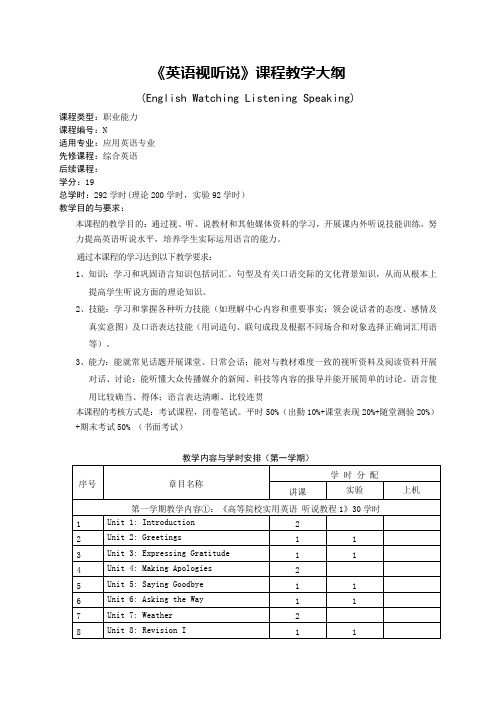
《英语视听说》课程教学大纲(English Watching Listening Speaking)课程类型:职业能力课程编号:N适用专业:应用英语专业先修课程:综合英语后续课程:学分:19总学时:292学时(理论200学时,实验92学时)教学目的与要求:本课程的教学目的:通过视、听、说教材和其他媒体资料的学习,开展课内外听说技能训练,努力提高英语听说水平,培养学生实际运用语言的能力。
通过本课程的学习达到以下教学要求:1、知识:学习和巩固语言知识包括词汇、句型及有关口语交际的文化背景知识,从而从根本上提高学生听说方面的理论知识。
2、技能:学习和掌握各种听力技能(如理解中心内容和重要事实;领会说话者的态度、感情及真实意图)及口语表达技能(用词造句、联句成段及根据不同场合和对象选择正确词汇用语等)。
3、能力:能就常见话题开展课堂、日常会话;能对与教材难度一致的视听资料及阅读资料开展对话、讨论;能听懂大众传播媒介的新闻、科技等内容的报导并能开展简单的讨论。
语言使用比较确当、得体;语言表达清晰、比较连贯本课程的考核方式是:考试课程,闭卷笔试。
平时50%(出勤10%+课堂表现20%+随堂测验20%)+期末考试50% (书面考试)教学内容与学时安排(第一学期)教学内容与学时安排(第二学期)绪论英语听力既是学习语言的一种途径,也是运用语言的一个过程。
收听英语新闻、歌曲,看英文原版录象,是集实用性和娱乐性于一身的提高英语听力的有效方式.英语学习者感到提高听力很困难.具体困难所在,不同水平的学习者有不同的状况.初学者由于练习少、反应慢,词汇量不足,一段话中只能零星地听懂一些单词或感觉耳熟.对已达一定英语水平的学习者来说,造成听力困难的原因有以下几点:一、读速快时听不清,尤其是在有连读.弱读的音节时,或是存在所谓“吞音”现象时听不清,因而影响整体判断。
开始时难以进入状态,影响了对下文的理解,或中间有不熟悉的单词,中断了理解;二、注意力过度集中于听懂当前语句,很快忘记前面所听过的内容;竭力听清每一个单词,可是往往会把握不住全篇。
《英语(3)(医学英语视听说)》课程教学大纲
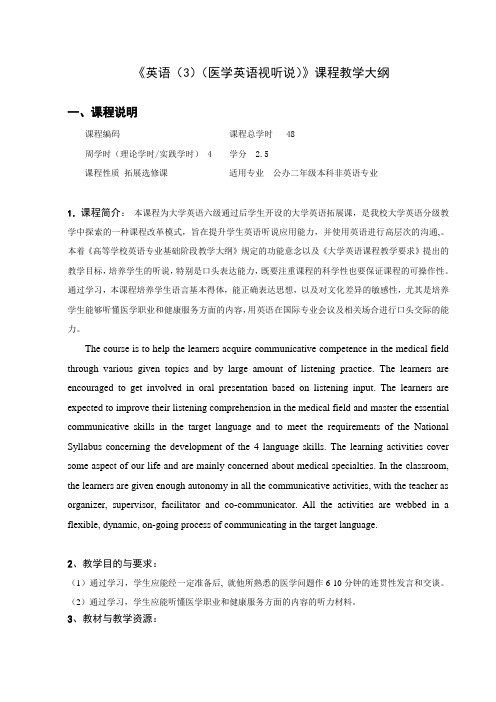
《英语(3)(医学英语视听说)》课程教学大纲一、课程说明课程编码课程总学时 48周学时(理论学时/实践学时) 4 学分 2.5课程性质拓展选修课适用专业公办二年级本科非英语专业1.课程简介:本课程为大学英语六级通过后学生开设的大学英语拓展课,是我校大学英语分级教学中探索的一种课程改革模式,旨在提升学生英语听说应用能力,并使用英语进行高层次的沟通,。
本着《高等学校英语专业基础阶段教学大纲》规定的功能意念以及《大学英语课程教学要求》提出的教学目标,培养学生的听说,特别是口头表达能力,既要注重课程的科学性也要保证课程的可操作性。
通过学习,本课程培养学生语言基本得体,能正确表达思想,以及对文化差异的敏感性,尤其是培养学生能够听懂医学职业和健康服务方面的内容,用英语在国际专业会议及相关场合进行口头交际的能力。
The course is to help the learners acquire communicative competence in the medical field through various given topics and by large amount of listening practice. The learners are encouraged to get involved in oral presentation based on listening input. The learners are expected to improve their listening comprehension in the medical field and master the essential communicative skills in the target language and to meet the requirements of the National Syllabus concerning the development of the 4 language skills. The learning activities cover some aspect of our life and are mainly concerned about medical specialties. In the classroom, the learners are given enough autonomy in all the communicative activities, with the teacher as organizer, supervisor, facilitator and co-communicator. All the activities are webbed in a flexible, dynamic, on-going process of communicating in the target language.2、教学目的与要求:(1)通过学习,学生应能经一定准备后, 就他所熟悉的医学问题作6-10分钟的连贯性发言和交谈。
英语听说课程教学大纲
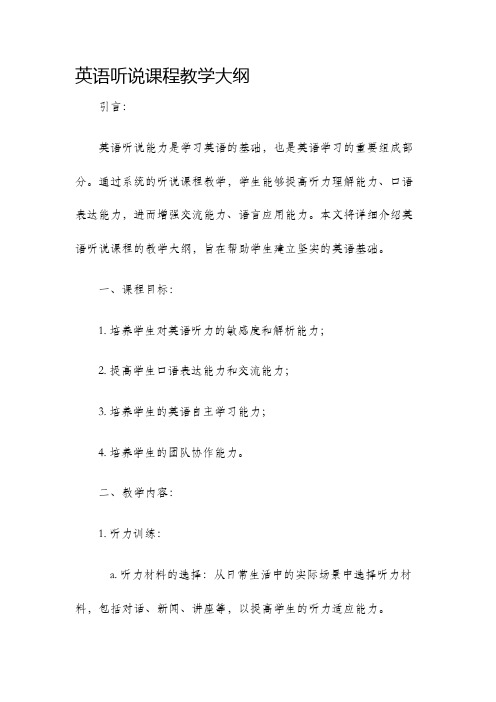
英语听说课程教学大纲引言:英语听说能力是学习英语的基础,也是英语学习的重要组成部分。
通过系统的听说课程教学,学生能够提高听力理解能力、口语表达能力,进而增强交流能力、语言应用能力。
本文将详细介绍英语听说课程的教学大纲,旨在帮助学生建立坚实的英语基础。
一、课程目标:1. 培养学生对英语听力的敏感度和解析能力;2. 提高学生口语表达能力和交流能力;3. 培养学生的英语自主学习能力;4. 培养学生的团队协作能力。
二、教学内容:1. 听力训练:a. 听力材料的选择:从日常生活中的实际场景中选择听力材料,包括对话、新闻、讲座等,以提高学生的听力适应能力。
b. 听力技巧的培养:引导学生掌握听力技巧,如预测信息、辨别关键词、捕捉语气等,以提高听力理解能力。
c. 听力实践的机会:通过听力训练活动,如听写、听力理解问答等,锻炼学生的听力反应速度和听力理解能力。
2. 口语表达:a. 口语训练的主题选择:选取与学生日常生活相关的话题,如家庭、学校、兴趣爱好等,以提高学生的口语表达能力。
b. 口语训练的形式安排:采用教师引导和学生互动的方式,如角色扮演、小组讨论等,激发学生参与讨论和表达的积极性。
c. 口语素材的积累:鼓励学生阅读相关的口语素材,如英语口语对话、英语口语杂志等,提高学生的口语表达水平。
3. 语音发音:a. 语音教学的基本规则:通过教授正确的发音规则和技巧,帮助学生纠正发音错误,提高语音准确性。
b. 语音训练的重点:注重学生的音标学习和语音模仿,通过实践训练,加强学生的语音感知和模仿能力。
c. 语音评估的反馈机制:定期进行语音评估,给予学生及时的反馈和指导,帮助学生不断完善语音发音。
4. 学习资源和工具:a. 媒体资源的利用:引导学生利用多种媒体资源,如英语广播、英语电视节目等,拓宽听说的学习渠道。
b. 学习工具的推荐:介绍一些实用的学习工具,如在线语音评估平台、英语学习APP等,提供便捷的学习辅助。
三、课程评估:1. 听力测试:通过听力测试,检测学生的听力理解能力,包括听力题目,如听力填空、听力选择等。
英语视听说课程教学大纲

《英语视听说》课程教学大纲(选修课)一、课程的性质和任务课程性质:听,说,读,写是英语学习的四项基本技能。
而视是辅助听说的最直接有效的方式。
在视的同时进行听力则更有利于提高听的效率和说的动力。
本课程为选修课之一,旨在提高各专业学生英语的听说能力。
主要任务:通过使用多媒体,网络等现代化教学工具,学习和欣赏外国原版情景剧,短剧,电影,增强学生对英语学习的兴趣,对原著英语文化,最地道英语的表达法的了解。
以能够在真实环境下进行基本的会话交流水平。
英语视听说课的学习不仅有助于培养学生的英语交际能力,也为提高学生的综合素质奠定一个良好的基础。
三、课程教学内容步骤1:导入部分(Lead-in)在这一阶段,可以使用指定教材《英语视听说》的Lead-in这一部分,通过并在此基础上进行关于观看多媒体上的动画,图片,短句为主,让学生能够讨论与单元主题相关的5个问题。
形成动脑思考和开口说的一种意识。
步骤2:听力训练(listening skills &listening-in)在这一阶段,可以使用指定教材《英语视听说》的(1—10)课。
在这一部分,教材每课都分为listening skills 和listening-in两部分。
listening skills 中主要设计了一些简易的短对话听力练习,可提供正常和慢速两种语速,且可任选语段复听,题型主要为选择填空题。
listening-in中主要以与主题相关的听力材料为主,配有生词与语言点讲解,内容丰富,形式多样。
题型为选择题和填充题和问答题。
这一部分有助于培养学生抓住主要内容及迅速反应的能力,速记能力,是学生听力提高的一个重要途径,也为学生进行口语训练打下听力基础。
同时,第二阶段的实际操作中,可以加入一些辅助材料,如英语原版电影,不仅可以培养学生的英语学习兴趣,也可以丰富教学内容,对提高学生的听力水平也有一定的帮助。
步骤3:口语训练(speaking out)我们称这一阶段为操练阶段,可分为speaking out 和Let’s talk两个部分。
大学英语视听说3

《大学英语视听说3》课程教学大纲一、基本信息二、课程简介(不超过300字)《大学英语视听说》课程教学旨在提高学生英语听说的交际能力。
本课程结合了听力、口语课程的一些基本功能,通过对学生进行听力、口语等英语视听说技能的训练,提高学生的听力理解水平、口语表达能力和对语言运用的分析理解能力。
以英语录音、录像、电影电视片等形式进行教学,经过系统的训练,使学生有较好的语言实际运用的能力和较强的视听说水平,同时增强其自主学习能力、提高综合文化素养,使他们在今后的工作和社会交往中能用英语有效进行口头和书面的交流。
三、知识点(一)基本知识点培养学生的英语综合(特别是听说)的应用能力,切实提高学生综合文化素养和跨文化交际的能力,以适应社会发展和国际交流的需要;同时增加听说学习策略的指导,强化学生自主学习的意识。
1. 英语语言知识,包括:英语语音,英语词汇,英语语法,英语修辞等等。
2. 中西方文化知识3. 听力技巧,口语表达策略,快速记录策略速等(二)重要知识点语音知识,语法知识、文学知识、文化知识四、基本要求(一)知识要求能听懂英语讲课,并能听懂题材熟悉、句子结构比较简单、基本没有生词、语速为每分钟110-120词的简短会话、谈话、报道和讲座,掌握其中心大意,抓住要点和有关细节,领会讲话者的观点和态度。
能就教材内容和适当的听力材料进行回答和复述,能用英语进行一般的日常会话,能就所熟悉的话题经准备后作简短发言,表达思想比较清楚,语音、语调基本正确。
(二)能力要求注重培养和提高学生的个性化学习及自主学习能力、自我发展能力和可持续性发展能力;营造个性化学习的环境,为学生提供自主学习的资源和场所,在培养他们积极主动的学习方法和思维方法、助其形成有效的学习策略的同时,提高他们的创新意识、创新能力、应用能力、分析和解决问题能力。
(三)素质要求应坚持以人为本,关注学生的情感,进一步激发学生学习英语的兴趣,帮助学生建立英语学习的成就感和自信心。
英语视听说课程教学大纲
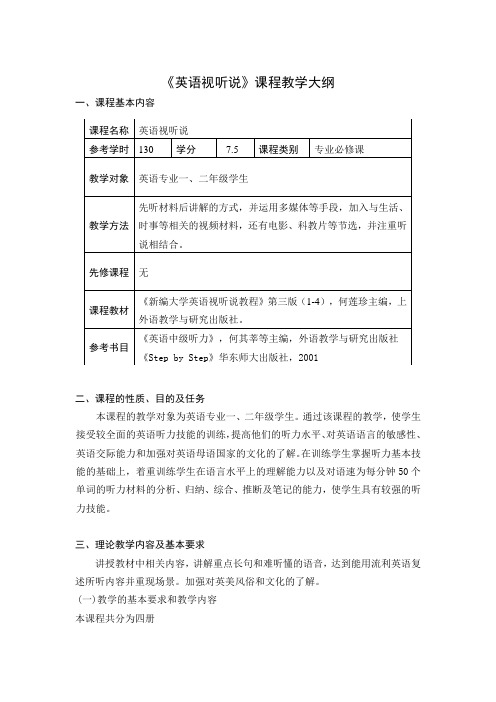
《英语视听说》课程教学大纲一、课程基本内容二、课程的性质、目的及任务本课程的教学对象为英语专业一、二年级学生。
通过该课程的教学,使学生接受较全面的英语听力技能的训练,提高他们的听力水平、对英语语言的敏感性、英语交际能力和加强对英语母语国家的文化的了解。
在训练学生掌握听力基本技能的基础上,着重训练学生在语言水平上的理解能力以及对语速为每分钟50个单词的听力材料的分析、归纳、综合、推断及笔记的能力,使学生具有较强的听力技能。
三、理论教学内容及基本要求讲授教材中相关内容,讲解重点长句和难听懂的语音,达到能用流利英语复述所听内容并重现场景。
加强对英美风俗和文化的了解。
(一)教学的基本要求和教学内容本课程共分为四册第一册Unit 1 Personal Relationships1、基本要求:正确理解各种人际关系。
2、教学内容:1)邻里关系;2)帮助他人;3)夫妻关系;4)理想的室友。
Unit 2 Remembering and Forgetting1、基本要求:记忆能力训练。
2、教学内容:1)健忘的教授;2)健忘的自己;3)记忆问题;4)记忆方法。
Unit 3 More than Words1、基本要求:身势语的功能与运用2、基本内容:1)马克吐温的故事;2)花语;3)交际技巧。
Unit 4 Fresh Start1、基本要求:大学新生的问题与解决方法2、教学内容:1)大学新生在国外;2)学习英文的方法;3)图书馆借书。
Unit 5 Animal World1、基本要求:各种动物的英文名称及故事2、教学内容:1)狐狸与兔子;2)老虎与农夫;3)救人的狗;4)新型动物Unit 6 World of Mystery1、基本要求:背景知识的理解与运用。
2、教学内容:1)UFO;2)翁贝托一世的故事;3)尼斯湖;4)人类与外星人Unit 7 Choices in Life1、基本要求:抉择的重要性。
2、教学内容:1)蚂蚁与蝉的故事;2)富翁的故事;3)合作。
大学英语听说课程教学大纲
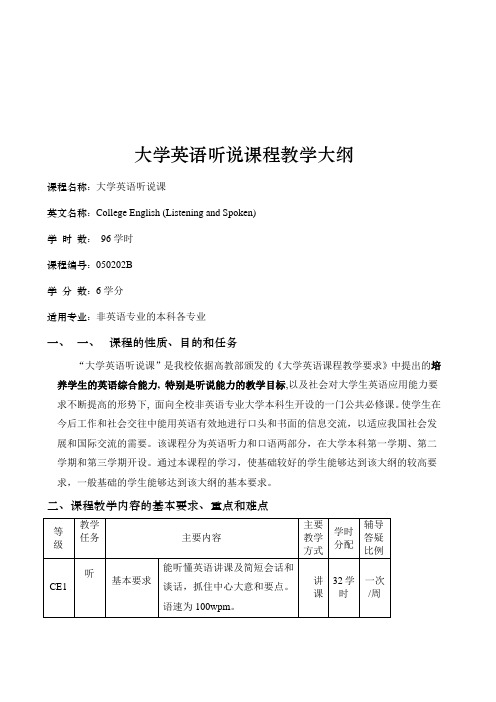
大学英语听说课程教学大纲课程名称:大学英语听说课英文名称:College English (Listening and Spoken)学时数:96学时课程编号:050202B学分数:6学分适用专业:非英语专业的本科各专业一、一、课程的性质、目的和任务“大学英语听说课”是我校依据高教部颁发的《大学英语课程教学要求》中提出的培养学生的英语综合能力, 特别是听说能力的教学目标,以及社会对大学生英语应用能力要求不断提高的形势下, 面向全校非英语专业大学本科生开设的一门公共必修课。
使学生在今后工作和社会交往中能用英语有效地进行口头和书面的信息交流,以适应我国社会发展和国际交流的需要。
该课程分为英语听力和口语两部分,在大学本科第一学期、第二学期和第三学期开设。
通过本课程的学习,使基础较好的学生能够达到该大纲的较高要求,一般基础的学生能够达到该大纲的基本要求。
二、课程教学内容的基本要求、重点和难点四、课程各教学环节的要求要求听说课在语音室上,每周一次两学时。
学生在课后参加学校组织的周英语角活动、各种英语晚会,每个班级每周组织一次英语角;学生上网做网上听说练习。
五、本课程与其他课程的联系本课程的后续课程是高年级的高级英语听说选修课。
六、考核方式大学英语听说课是考试课,考试形式是(1)由主考教师对学生进行小组面试;(2)组织听力考试;(3)通过网络测试手段,检查学生完成指定的网络测试项目。
评分标准:口试占40%,听力占60%,合计100分。
七、教学参考书目1、《新视野大学英语》听说教程1-4外语教学与研究出版社2001年底1版2、《大学英语听力分级教程》上、下册。
孙力主编。
吉林科学技术出版社出版。
2002年3、《新编大学英语》1、2、3、4册。
浙江大学编著。
外语教学与研究出版社。
1999年4月第一版。
2004 至2005 学年度第一学期04级各班《大学英语听力》课程授课计划一、一、说明1.1.课程的教学目的要求通过这一学期的英语教学,培养学生具有一定的听、说能力。
- 1、下载文档前请自行甄别文档内容的完整性,平台不提供额外的编辑、内容补充、找答案等附加服务。
- 2、"仅部分预览"的文档,不可在线预览部分如存在完整性等问题,可反馈申请退款(可完整预览的文档不适用该条件!)。
- 3、如文档侵犯您的权益,请联系客服反馈,我们会尽快为您处理(人工客服工作时间:9:00-18:30)。
《英语听说课程》教学大纲
课程名称:《英语听说课程》
开课专业:应用法律系、监狱劳教系、司法技术系各专业
学时:50学时
课程性质:必修
考核方式:闭卷
一、课程总体基本要求:
英语听说课程是英语教学的一个重要组成部分。
通过听说课程的教学,基本上改变以往学生英语听力能力培养相对滞后的局面,避免“聋哑”英语的情况出现,使学生的英语听说能力的培养与读、写、译等能力的培养实现同步均衡的发展,并在日常交际和业务活动中能够进行较为简单的口头交流,在课堂上加强实际能力的培养,达到国家高职高专教育英语课程教学基本要求中对于学生听说能力的培养目标。
二、课程培养目标和教学内容:
1.培养目标:通过听说教程的学习,要求学生达到下列要求:
①听懂一般的日常交谈用语,抓住讲话和交谈的中心大意;
②运用简单的日常英语进行对话,并能就所听、读的材料回答问题及复述,做到语音、
语调、语法基本正确;
③对一般日常生活话题进行简单的交谈;
④经一定的准备后,就熟悉的话题做3—5分钟连贯性的发言;
⑤听懂一般交谈和简短讲话,辨别讲话人的态度和语气;
⑥与英美等国家人士谈论日常生活和社会生活话题,比较准确地表达思想,语言基本得体。
2.教学内容:
听说理论课的主要教学内容包括:
①语音和朗读训练;
②听说基本技能训练;
③听说交际技能训练和篇章听说技能训练。
三、教学方法
1.将英语语言基础知识学习、语言应用技能训练和影响到交际效能的文化背景知识介绍有机地融合在一起,突击语言的交际语境和实用的功能意念,在强化语言基本训练的同时,注重语言交际技能的培养和训练,显凸学生所处的生活学习环境和文化氛围,力求使英语学习做到学用结合,学以致用,学后会用。
2、根据认知语言文学和语言习得理论的研究成果,在各单元的题材选择上,力求从学生的英语语言基础、个人
兴趣爱好、实际交流需求出发,通过题材广泛、短小精悍的学生素材,尽可能将知识性、趣味性、实用性和可思性融合在一起,以便充分调动学生学习的主动性和积极性。
3、在处理听与说的关系时,以听为导入,以说为目标,让学生首先轻松愉快地接受和领会有关的语言信息,然
后兴趣盎然地加以模仿,力求让学生做到有话可说,有话要说和有话会说,从而完成听说技能的转换和提高。
四、听力实训的教学目的与任务
语言实训课部分是通过一系列具体的表现形式,训练学生实际运用语言的能力,按照《高职高专英语基本要求》所规定的交际范围表,为学生提供100%的英语环境,提高学生英语综合水平。
五、实训课的主题和范围
(一)日常生活交际主题:
介绍、问候、感谢、致歉、道别、指点、接受、拒绝、问询、天气、学习、爱好、饮食、健康、间距等等。
(二)日常涉外交际主题:
迎送、安排日程与活动、安排住宿、宴请与迎送会、陪同购物、游览、就诊等。
(三)一般涉外业务交际主题:
面试、公司/工厂简介:历史、现状;产品介绍:类型、性能、规格、市场等;市场推销、人员培训、业务洽谈、合作意向、投资方向、商品订购、付款方式、谈论价格、业务交流、签定合同等等。
六、实训内容主要包括:
1. 发音训练:说一口标准的英语,较系统而全面地掌握发音知识。
2. 口语技能训练:通过大量的口语技能训练和语音实践活动,巩固和扩展所学语音功能
的常用句型,强化交际技能。
3. 口语话题讨论:通过对不同话题的讨论,加深对英美等主要英语国家文化背景和生活
习俗的了解,学会在具体语境中进行正确得体的交际。
4. 根据日常生活及涉外的交际主题编排小品、情景剧进行表演。
5. 听英语国家卫星广播节目的内容及中央电视台9频道英语节目,抓住其要点和有关的细节。
6. 观看经典英语电影,尽量选取一些生活气息浓厚,贴近时代潮流,人物对白清晰的电影,以激发学生学习的热情。
训练方式:谈观后感,模仿经典片断进行表演,归纳日常用语的通俗表述法。
七、课时分配:
八、考核方式:
英语听说课程为考试课。
测试要做到科学、公平和规范。
我们采用与基础英语课程相同的评价方式即:形成性评价和终结性评价相结合的评价方式并贯穿整个教学过程。
九、学期成绩=平时成绩(50%)+卷面成绩(50%)=100, 经过换算后与基础英语一起评定出学生基础英语的最
终成绩。
十、教材及参考用书:
选用国家高职高职统编教材《实用听说教程》及其教师参考用书,教材集音、像为一体的教学资源。
教材由上海外语教学与研究出版出版。
